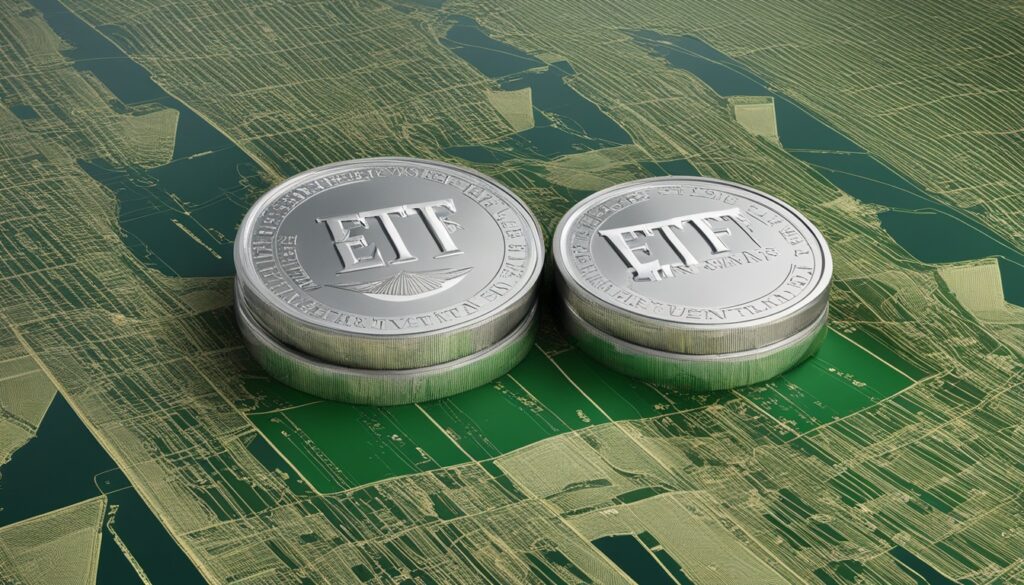Thinking about investing, but not sure where to start? Mutual funds and ETFs are solid choices. They help you mix your investments to reach your financial dreams. Understanding how they work is crucial before you choose. Let’s dive into what sets mutual funds and ETFs apart.
Key Takeaways:
- Mutual funds and ETFs offer exposure to a variety of asset classes, aiding in the creation of a diversified portfolio.
- Mutual funds are managed by professionals who actively or passively select investments, while ETFs are typically passively managed.
- ETFs can be traded on stock exchanges throughout the day, while mutual funds are bought and sold at the end-of-day NAV.
- Costs associated with ETFs include commissions, expense ratios, and bid/ask spreads, whereas mutual funds may charge expense ratios and other fees.
- ETFs often generate fewer capital gains than mutual funds, enhancing tax efficiency for investors.
What are Mutual Funds?
Mutual funds pool money from many investors to create a diversified portfolio. They invest in stocks, bonds, and other assets. A team of professional managers handle the fund’s portfolio. This means investors can own a small part of many investments without dealing with them directly.
Mutual funds offer a big plus: access to expertly managed portfolios. Fund managers pick and watch over investments for those investing in the fund. This lets anyone enjoy the skills of seasoned financial experts.
There are two types of mutual funds, managed and passive. Managed funds have a team that actively chooses what to include in the portfolio. They try to beat the market. Passive funds, however, aim to match an index’s performance, like the S&P 500, rather than outperform it.
Investors can trade mutual fund shares at the end-of-day price. They can buy or sell without worrying about individual stock prices. This makes getting in or out of the market easier.
Mutual funds give everyday people a chance to invest in a broad range of securities. They are managed by professionals who help them reach their financial goals.
Advantages of Mutual Funds:
- Diversified Portfolio: Investing through mutual funds helps spread risk by owning various security types.
- Professional Management: Teams of fund managers make smart choices about what to invest in, which can lead to better returns.
- Accessibility: Anyone can invest in mutual funds, making them a straightforward option for building wealth.
- Liquidity: The ease of buying and selling mutual funds offers flexibility and easy access to your money.
“Mutual funds offer the benefit of diversification, expert management, and easy investment opportunities.” – John Smith, Certified Financial Planner.
It’s crucial for investors to grasp the benefits of mutual funds. With their variety of investments and professional management, they are a smart choice for many people’s financial plans.
What are ETFs?
ETFs, or exchange-traded funds, are like stocks but represent a group of investments. They are traded on the stock market like individual shares. They gather money from investors to make a diversified mix of stocks or bonds that follow an index. This is similar to mutual funds but with important differences.
These funds usually follow a ‘do nothing’ strategy, copying the performance of an index. Their prices change throughout the day depending on market activity. This is different from mutual funds whose prices only update at the end of the trading day.
Another difference is how you can trade ETFs. You can use different trading strategies, including selling your shares short. With mutual funds, these options are limited or not possible.

Benefits of ETFs
- ETFs are clear about what’s in them, showing their holdings daily.
- They can be bought and sold quickly during the trading day, giving investors flexibility.
- They help spread out risk by including many types of investments.
- ETFs often cost less to own than mutual funds, saving investors money.
“ETFs are a great way for investors to jump into different parts of the market without picking single stocks. They’re a hit with those who prefer hands-off investing or have specific goals in mind.”
We can compare mutual funds and ETFs when it comes to how they trade and are managed:
| Mutual Funds | ETFs |
|---|---|
| Traded at NAV at the end of the trading day | Bought and sold at market prices throughout the trading day |
| Actively or passively managed | Typically passively managed |
| No intraday trading options | Various trading strategies available |
Overall, ETFs are a flexible, low-cost way for investors to get into different markets. They work well for those who like active trading or want a mix of investment tools.
Key Differences between Mutual Funds and ETFs
Choosing between mutual funds and ETFs means knowing what makes them different. Each type comes with its own benefits and features. These can change how investors trade, the costs involved, and tax implications.
Managed vs. Passive
Mutual funds and ETFs differ in how they’re looked after. Mutual funds might be managed actively or passively, depending on the fund’s goals. An active manager chooses and handles the fund’s investments. Whereas, ETFs follow a specific index’s performance, so they’re usually managed passively.
Trading
Trading mutual funds and ETFs also varies. Mutual funds are sold and bought through the investment company, using the day’s final price. But ETFs trade on stock exchanges at current market prices all day. This means ETFs can be traded more easily during the day, for those who want to react to market changes quickly.
Minimum Investment
When it comes to how much you can start with, mutual funds and ETFs have different rules. ETFs don’t ask for a minimum amount, making it easy to buy whole shares. In contrast, mutual funds might need a certain sum to begin, which could make them less accessible for some.
Costs
The expenses of mutual funds and ETFs can also be different. ETFs have costs like commissions, operating expenses, and sometimes extra charges when buying or selling. Mutual funds, on the other hand, have their own set of fees. However, because there aren’t trading commissions for mutual funds, they might be the better choice for those who trade often.
Tax Efficiency
Taxes are something to look at when comparing ETFs and mutual funds. ETFs are usually better for tax reasons. They tend to have fewer capital gains thanks to how their securities are managed. This can give investors tax advantages. But when mutual funds sell securities, it might mean taxes for investors.
Conclusion
When investing, you should look at what you like, your finance goals, and how much risk you’re okay with. Mutual funds and exchange-traded funds (ETFs) each have their plus and minus points. They fit different types of investors and needs.
If you want someone to really manage your money and like a mix of investments, you might like mutual funds. They let you invest in lots of different things. But if you like to pick your own investments and trade whenever you want, ETFs could be better.
ETFs follow the ups and downs of certain markets. They give you a broad look at different areas. This is good for those wanting to invest in specific parts of the economy.
It’s key to really think about your own situation when choosing what to invest in. Talking to a financial advisor can help a lot. Knowing the differences between mutual funds and ETFs can help you build a strong investment plan. One that meets your goals and helps you save for the future, including retirement.
FAQ
What are mutual funds?
Mutual funds gather money from many people. This money is then used to buy different securities. These include stocks and bonds. You can buy or sell them daily at their net asset value (NAV).
What are ETFs?
ETFs are funds traded like stocks on an exchange. They also gather money from investors to buy various securities. Unlike mutual funds, their prices move all day based on supply and demand.
What is the difference between mutual funds and ETFs?
The key difference is in how they are bought and their management. Mutual funds can be actively or passively managed and are bought at the end-of-day value. ETFs are passively managed and bought and sold all day at varying prices.
How do costs differ between mutual funds and ETFs?
ETFs and mutual funds have different costs. ETFs might have added trading costs but usually have lower expense ratios. Mutual funds have no trading costs but their expense ratios might be higher.
Which is more tax-efficient, mutual funds or ETFs?
ETFs tend to be better for taxes because they trade less. This reduces capital gains for investors. On the other hand, selling securities within mutual funds can create capital gains taxes for shareholders.
Is there a minimum investment requirement for mutual funds and ETFs?
For ETFs, you might not need a lot of money to start, but you must buy whole shares. Mutual funds, however, could need a certain amount as a minimum initial investment.
Which investment option should I choose?
The right choice between ETFs and mutual funds depends on several things. This includes how you like to invest, your tax concerns, and what you’re investing for. Often, a mix of the two can be good. Getting advice from a financial expert is a smart move to match your investment with your goals.



